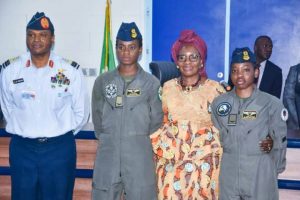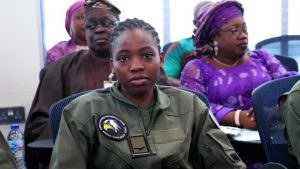Tolulope Arotile is dead and gone to heaven, if the testimonial on her purity by her anguished father who appeared on Channels Television in the wake of her demise is anything to go by. Intervention has no ambition of engaging in the bad diplomacy of waking emotions around her death anymore. It could have happened anywhere else too although there is something that bears pointing out. The majority of us who think in the ways of ‘bloody civilians’ would have thought that officers carrying out sensitive duties at a particular time would be held in spaces where what befell the late Arotile would be impossible. That does not appear to be the established protocol. Or she would not have been found trekking before old friends would spot her and, perhaps, overwhelmed by excitement, drive in a manner that led to the disaster. And to learn that she was staying with relations in an atmosphere where a thug, a drunken fellow or armed robbers could easily get at her didn’t also sound right. But, as stated earlier, this may be no more than the emotional views of a ‘bloody civilian’ far removed from how the Air Force works. For, it is even possible that the Air Force has a Panoptic surveillance machinery that keeps all such operatives in view wherever they might be or has kitted them to anticipate and take on such threats, especially in an anarchical society like Nigeria
But that preface is by the way. The real or substantive issue warranting this article is to place in proper perspective what Tolulope actually signified. And Intervention does that by re-publishing the story it published on October 18th, 2019 when Arotile and Kafayat Sanni were commissioned as officers, (https://intervention.ng/17831/). It has not been necessary to add anything new to that stuff because the two young women officers as fulfillment of the feminist argument in international security remains well made. Only the cover picture has now been changed from that of Siddique Abubakar, (CAS) and Women Affairs Minister, Pauline Tallen with the two newly commissioned officers to that of the late Arotile alone.

At their becoming on October 15th, 2019: CAS, Kafayat, Tallen and Arotile
It is not clear why the Nigerian Air Force, (NAF) did not organise a much, more elaborate celebration of its winging of the first female combat pilot and first female helicopter pilot on October 15th, 2019. Except if it pleads its involvement in containing the generalised insecurity and the counter-insurgency operation against Boko Haram as the reason, the making of the female officers is the stuff of exceptionalism. This is not only because such symbolic moments are the glue that binds a nation, it is also because an African Air Force has made a grand and progressive entry into a historical controversy in international security. Historically, the debate has been on: can we give women the guns?
No country in the world has settled the debate. Many are managing it but it remains. When American troops rescued Jessica Lynch in a Rambo style military operation in April 2003 in Iraq, the controversy deepened, attracting attention on this issue of suitability of women for military service. In spite of the controversy that trailed the contending narratives of her travails, her being taken a Prisoner of War, (POW) raised questions. Was her capture the conclusive evidence of the unsuitability of women as soldiers because of perceived extra vulnerability or was it the conclusive evidence that women too can die for their country in the same way that men soldiers do?

Lynch

Dr Cohn
Implying extra vulnerability to capture is what some of her conscious and unconscious defenders have not taken lightly. They hit back by asking if it is only women who are taken Prisoners of War. After all, a disputed number of men died in the ambush in which Lynch was captured. But the question was made more complicated by what she said when she was interviewed after her rescue. It was just one of the many things she said but expressing her desire to be a home maker too, like most other women was isolated as evidence of the difficulty of hoping to ever convert women into violent warriors.
From Lynch, the controversy moved to Carol Cohn who published “Sex and Death in the Rational World of Defence Intellectuals” in 1987. The paper is still a recommended text in Gender and International Security. This happens because no text has provided as much elaborate details of the sexual imagination that underwrite nuclear warfare as her paper. Finding herself in the world of practitioners of nuclear strategy, she couldn’t believe the degree of the phallic imagination that circumscribe that deadly enterprise. She was perplexed by the possibility of the sexual sub-text of nuclear-speak or what she call ‘technostrategic’. Not so much by the cold bloodiness of these otherwise great guys but that “there was no evidence that any feminist critiques had ever reached the ears, much less the minds of these men”
This is why the NAF would have been justified to even organise a seminar on the import of Kafayat Sanni and Tolulope Arotile’s becoming. The import is that the force has been able to say yes and loudly too that it ‘can give women the guns’. By doing so to, it is contributing seriously to an issue that remains as complicated as ever, given the contentions around the question.

Kafayat Sanni

Tolulope Arotile
One argument is that it will be a classic case of exclusionary practice if women are not given the guns because they are half the population. The other position is how dangerous it would be to suggest that women are incapable of the heroism of dying for one’s country which is what soldiering boils down to. These are the sort of positions advanced by agitators for enlisting women into the military.
There are the contending positions, which are no less logical. If the military exists to protect everyone, especially women and children, why is it important to include women again? That is one position. There is a second. It points at the contradiction of insisting on women combatants when women are supposed to be pro-peace, calm and against the kind of violence military norms permit.
Good or bad, right or wrong, women are on the move in military professionalism. The process is irreversible. But that is not to forget that the military is arriving at that over a long period of struggle against exclusion of women. The military hierarchy across the world has had to come to grips with the reality. There is, therefore, something for everybody in Kafayat Sanni and Tolulope Arotile’s becoming – something positive for Nigeria’s image, for equalitarian agitators in gender terms, for the NAF and for modernity.




























